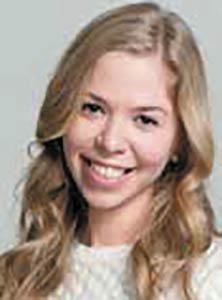
I spoke recently in a number of schools on the subject of eating disorder awareness. Each time I speak, my presentations vary as I generally speak from my heart and mind in the moment. The program is fluid and meets the needs and questions of those in attendance. Each time I speak, though, I am sure to mention the basics around eating disorders: what they are, clinically and in “layman’s terms”; textbook definitions; and myths disproved.
Each time I speak I find that the most confusion lies in the topic of Bulimia Nervosa and its definition. While Bulimia is the second most common eating disorder—following Binge Eating Disorder, followed by Anorexia Nervosa (I know, not what you’d expect)—it is highly misunderstood. Bulimia is when an individual eats an exorbitant number of calories in a short amount of time—also known as a binge—followed by getting rid of said food in some manner, also known as a purge. The most commonly known purge is through vomiting. There are, though, other types of purging including laxative use as well as exercise. If an individual eats a regular amount of food, say a meal, and then gets rid of it, this would not be Bulimia but instead might fall into the category of Anorexia Nervosa purge type, or could be classified under OSFED (Other Specified Feeding and Eating Disorders). I feel this is important to mention as that is generally what people think Bulimia is all about and what gets talked about on television shows, but this is a gross misunderstanding.
I could go on and on about why labels and specific diagnoses are unimportant and why instead we must focus on the suffering and emotional and mental turmoil, but for the sake of this piece I’d like to instead focus on the subject of purging via exercise.
It is this type of purging that often needles its way into our society, masking itself as something accepted and even glamorized. I am not specifically talking about Bulimia or those who suffer from Bulimia, but instead the concept of “working off the food” as an accepted practice. One will often hear “I just had a big breakfast, but I’m going to work it off at the gym.” Or, “I really want to be able to eat dessert tonight so I’ll stay on the treadmill until I reach the same number of calories as that cheesecake and then I’ll let myself eat it.”
Readers, friends, this is not a normal relationship with food or exercise. Food is meant to be enjoyed—to eat when one is hungry and stop when full and to be had in variety. Exercise is meant to keep our bodies strong and healthy, to perhaps allow an individual to feel/be fit, and to release endorphins and aid in sleep and other aspects of human life. It is not meant to allow for reward and punishment.
This is not to say that those who think this way about exercise have an eating disorder; as mentioned, this has become commonplace. However, it is to say that it is a disordered way of thinking. Life is not meant to be lived like an equation: eat x amount and get rid of it. There are times when people use this in other areas of life: If I do x amount of studying my reward can be an hour of television. It complicates things when it includes our fuel and our self-esteem. It brings to mind the question of whether one would deserve the cheesecake or television if not for the work being put in. Reward can be a motivating factor that leads individuals to get their work done, etc. But exercise and food should not be thought of as work or a chore. Food is delicious fuel and depriving oneself is a recent phenomenon, one that with consciousness we can begin to challenge. This is not to say that it would be healthy to just eat everything all the time; that could lead to sickness. Instead, eating when hungry and stopping when full in moderation would define the appropriate relationship with food. Exercise may be to target weight, but hopefully not in a way that creates a reward system and instead is about keeping the body strong.
I would be remiss not to add in my final thoughts that true self-worth and self-esteem will not come from eating or not eating the cheesecake. This is simply a mask, a short-term targetable concept. Rather, self-esteem comes from character and one’s mind, heart and soul. Sure, who doesn’t want to feel like s/he looks nice? But when this becomes the priority we must reevaluate our actions and choices.
So instead of working off that pasta, instead try to enjoy it. Eat until you’re full. Have variety in your meals. You deserve the food you want simply because you’re human. You don’t need to earn it. Let us work together to change the language from earning it to enjoying it.
By Temimah Zucker, LMSW
Temimah Zucker is a social working hailing from Teaneck, NJ who specializes in working with those struggling with eating disorders. She is a primary therapist at Monte Nido Manhattan and also provides public speaking and mentorship on the subject. For inquiries, email tzuckerSW@gmail.com.











